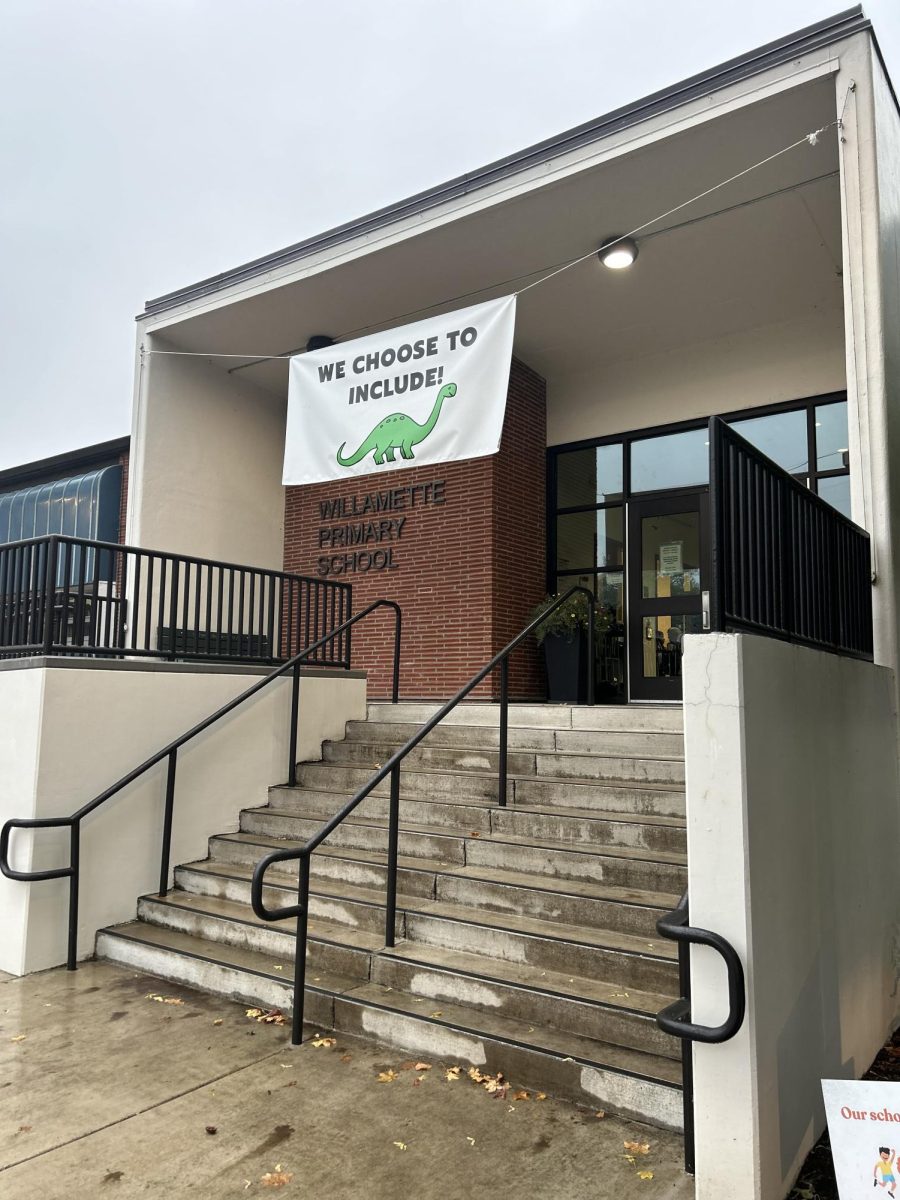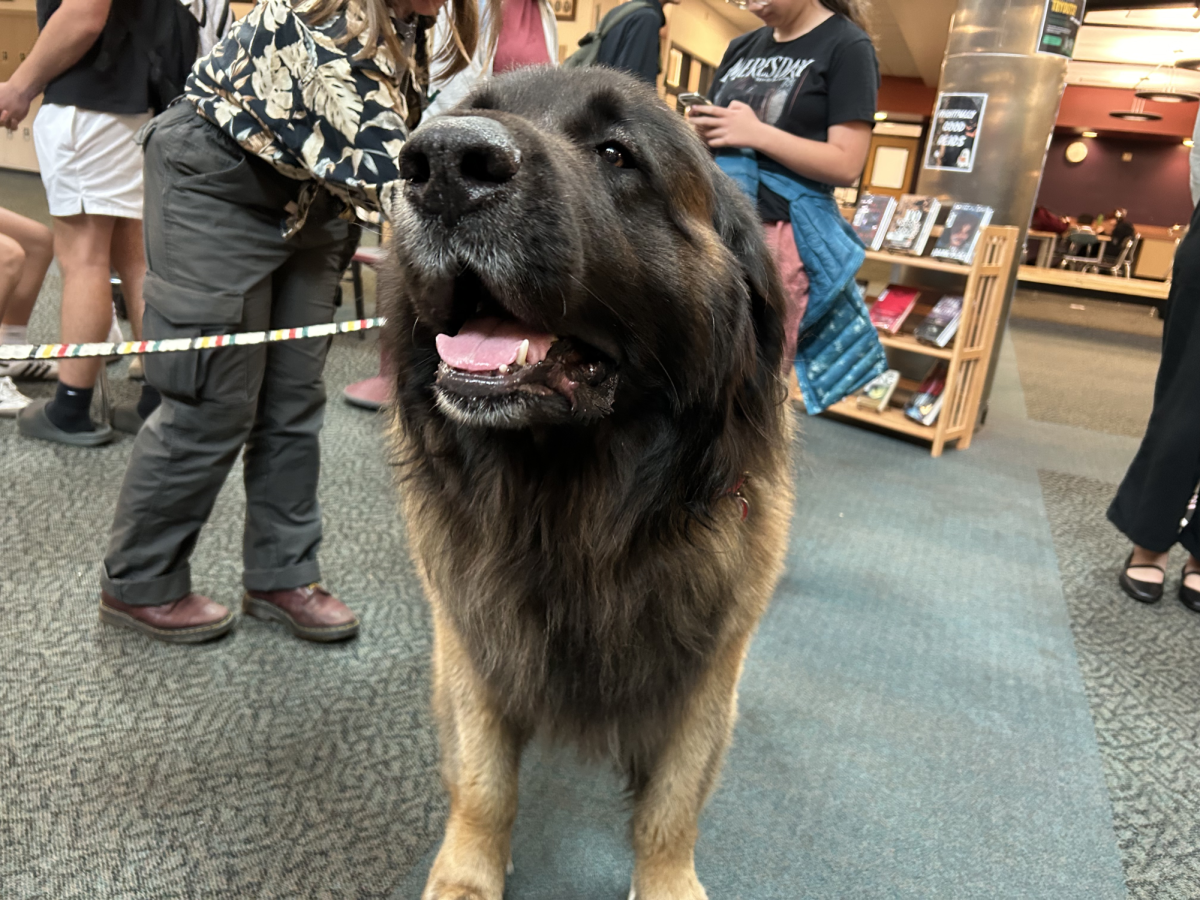Since 2008, the West Linn Public Library has welcomed furry visitors for a special program: Tales to Tails. Children in elementary school can take part in the program, where they spend 20 minutes reading to one of ten participating therapy dogs. The goal is for children to practice reading and spend time with the service animals.
Sandi Box has been the public library’s volunteer coordinator since 2018. Box’s duties include the Tales to Tails program, where she recruits the dogs and assigns their work days. Each day has four openings, and the program operates on Wednesdays and Thursdays during the school year, not the summer months.
According to the Alliance of Therapy Dogs, therapy dogs are trained to provide comfort and affection to people they visit. These dogs visit various places to help people, such as hospitals, disaster areas, and schools.
Therapy dogs’ purpose is to help the emotional state of whoever they visit. This makes them different from service dogs who are “individually trained to perform specific tasks and to work with people with disabilities,” according to the American Kennel Club. Service dogs most commonly work with one specific person, trained to assist with their specific needs. These dogs have full public access rights under the Americans with Disabilities Act (ADA), meaning they can go on planes, enter restaurants, and go to other public spaces. Therapy dogs do not share the same rights through the ADA.
Grace Heath, sophomore, is the leader of the new Lions and Canines club on campus. After receiving her service dog, Harp, Heath was inspired to train them.
“Harp has helped me in so many ways. We wanted to give back and help someone else with disabilities,” Heath said.
Heath is a puppy handler who volunteers to spend over a year exposing the dogs to new environments, taking care of them, and training them before sending them to get professional training in Santa Rosa, California. Heath has sent one dog, Chai, to Santa Rosa, and is training her second dog, Anoushka.
Although they are similar, the process of training service dogs is different from therapy dogs.
Service dog breeding programs, such as Canine Companions, work with dogs from birth, while therapy dogs become trained and either registered or certified later in their lives. The Lions and Canines Club is working on fundraising for Canine Companions, and the money raised will go to Coffee Creek Correctional Facility to support their service dog training program.
At the public library, the dogs are registered therapy dogs who have passed the state test and met other requirements. The handlers are trained as well. Some therapy dogs were trained as service dogs but didn’t end up graduating, resulting in a temperament that suits therapy dog work. The library works with Pet Partners to connect with handlers willing to participate in Tales to Tails.
The kids lead the session, separated from the library by a privacy screen, and the only other person with the children is the handler. Kids can pet the dogs or read to them.
“Seeing the kids interacting with the dogs, practicing their reading, they get more confidence, and there’s not anyone there to correct them or make them self-conscious. The dogs don’t care,” Box said. “It’s so non-judgmental. The kids are in the driver’s seat.”
Tales to Tails wasn’t in operation during COVID-19 but was able to find new volunteer dogs and handlers, bringing the program back in the following years. As long as people keep signing up, Box foresees the program continuing.
“It’s something that people enjoy, and as long as they keep signing up for it and coming, we will do it,” Box said.
West Linn High School has experimented with therapy animals in the past and continues to do so. Sources of Strength had a therapy dog come in for Mental Health Awareness Month this year. Regarding service animals, the Lions and Canines Club brought a service dog to the recent Club Fair event.
Matt Cutler, a Personal Growth and Development teacher, has had therapy dogs in his classroom on multiple occasions and has worked with Sources of Strength. The students in Cutler’s class and at Sources of Strength were able to pet the dog and learn about it.
“All of my students seemed pretty jazzed, either neutral [or] excited,” Cutler said. “I saw a lot of students who are normally pretty quiet or reserved go start petting the dog, start talking about their own pets. I think it was a nice way for students to connect. I think it was a very joyful, positive experience overall.”
According to the National Network to Eliminate Disparities in Behavioral Health, it has been shown that therapy dogs support students’ emotional and social needs, improving their learning, but also increasing confidence, attendance, and motivation.
“There’s a lot of research that shows that it can be really beneficial for students, even if nothing’s wrong,” Cutler said. “It is really nice if someone’s feeling stressed to have this really sweet dog to pet or interact with.”
Aside from getting dogs into classrooms, Conor Greaney, teacher librarian, has talked with the West Linn Public Library staff about hosting a therapy dog in the school’s library. On Sept. 19 during lunch, Booker, one of the Tales to Tails dogs, came to the school with Melanie Nelson, a public library staff member. Visits like this are one way that therapy dogs and their mental health benefits may become more accessible to West Linn students.






























































![At the bottom of the third inning, the Lions are still scoreless. Rowe stands at home plate, preparing to bat, while Vandenbrink stands off to the side as the next batter up. Despite having the bases loaded, the team was unable to score any runs. “It’s just the beginning of the season. We’re just going to be playing out best by June, [and] that’s where champions are,” Rowe said.](https://wlhsnow.com/wp-content/uploads/2024/03/IMG_3077-1200x900.jpg)







































![All smiles. The group poses for a photo with last year’s book, “This is Our House,” along with their award for third Best in Show. Meikle, who was an Editor-in-Chief for the yearbook last year as well, holds both and stands at the center of the group. “That was an amazing feeling, going and grabbing the third place award,” Meikle said. “All of it paid off. I cried so much over that book, being able to receive [the award] was one of the highlights of my high school career, it was like the coolest thing ever.”](https://wlhsnow.com/wp-content/uploads/2024/11/8bookpose_philly-1200x800.jpg)














